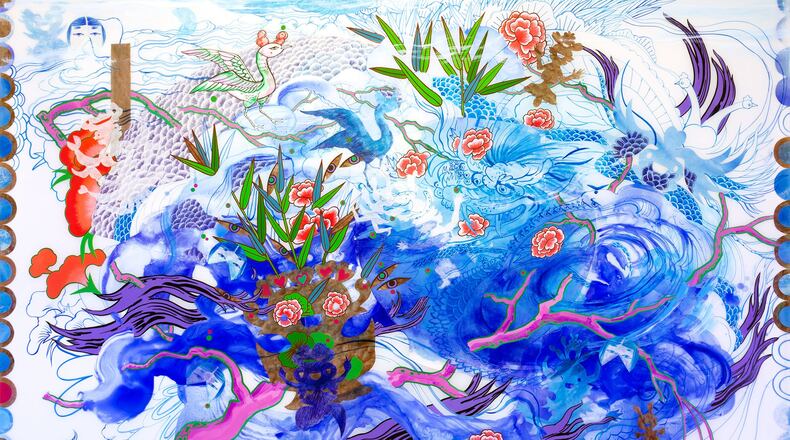Atlanta-based, South Korean-born artist Jiha Moon’s paintings look like contained explosions, the world blown to smithereens. There’s the suggestive tang of gunpowder in the air and billowing smoke seems to dissipate as we contemplate her manic miasmas of color and form.
But look closely at Moon’s works painted on glossy Mylar, and all is not destruction and chaos. Instead there are folk tales and familiar apparitions emerging from the fog: beasts and sprites, dragons and fish, twisting trees and peeping eyeballs watching us as we watch them.
Moon’s paintings and ceramic sculptures are indeed explosions of a sort. They are explosions of culture; wild, mutating, roiling, head-butting blends of East and West, pop culture and ancient art, craft and crap, the commercial and the eternal, frightening and cute. Moon somehow finds the cuteness across the centuries, whether in Mexican shaman folk art or cutie-pie emoticons, and mixes them with the ancient in her wild, swirling cyclones of references.
>> RELATED: Polka-dotted Kusama Fever strikes the High
Herself a hybrid of Korea and America, Moon has taken full advantage of the strange circumstance of straddling multiple worlds in “Where Serpents Change Their Skin,” her clever, culturally omnivorous solo show at Alan Avery Art Company. Moon finds the pop, cartoonish sensibility in artwork of the past and present in paintings like “Redpineyes” in ink and acrylic on hanji paper mounted to canvas. Against a fanlike blue backdrop, Moon delivers long-lashed eyeballs staring out at us, cartoonish fangs, fish scales and a bright red branch cutting through the chaos of the natural world and its exotic beasts.
Moon’s paintings are also filled with wit and whimsy, a “Where’s Waldo” seek-and-find with all manner of influences hiding in plain sight. But it’s Moon’s reimagined vases that really delight with their cross-cultural references to Southern jug art and Asian porcelain with its characteristic blue and white patterns.
These bawdy-meets-delicate sculptures look like porcelain vases transformed from decorative objects into living, breathing creatures, with the anthropomorphic appeal of Disney’s dancing teapots and googly-eye broomsticks. In her wild style vases, tiny, pudgy baby doll legs and feet emerge from the vessels, and blinking eyes and gaping mouths suggest teapots apt to giggle and talk back. With their inspired and strange hybrids and mutating forms, they are the art world equivalent of Atlanta’s multicultural fusion cuisine where kimchi and grits, pork belly and congee all come together in one delicious brew.
>> RELATED: Global Mashup: Spring Dining Guide 2018
Moon's earthenware vessel "Kudzu in My Heart" is as nutty and red-polka dotted as anything Yayoi Kusama could dream up, a kind of loopy teapot with handle and a tiny grinning mouth and fronds of Georgia's favorite invasive vine (itself an export from Asia) snaking around its body like a tattoo. "Big Bird" is an homage to a revered American cultural icon, "Sesame Street"'s gangly, loping goofus. Moon ornaments her bird-brained vessel with fat, featherlike layers of clay the color of yellow rain slickers, ceramic fortune cookies and a long cord with a smiling happy face. One of the most beguiling sculptural works in the show, the piece encapsulates the playfulness and pure lark-factor of Moon's sensibility.
Part of Moon’s point is the essential mashup nature of all culture, not simply those she has directly experienced, and in “Where Serpents Change Their Skin,” she makes a fascinating, persuasive case.
ART REVIEW
“Where Serpents Change Their Skin”
Through Jan. 5. 10 a.m.-6 p.m. Tuesdays-Fridays; 11 a.m.-5 p.m. Saturdays. Free. Alan Avery Art Company, 656 Miami Circle NE, Atlanta. 404-237-0370, alanaveryartcompany.com.
Bottom line: East meets West and pop culture meets the ancient in Atlanta artist Jiha Moon's wild style culture clash.
About the Author
Keep Reading
The Latest
Featured





